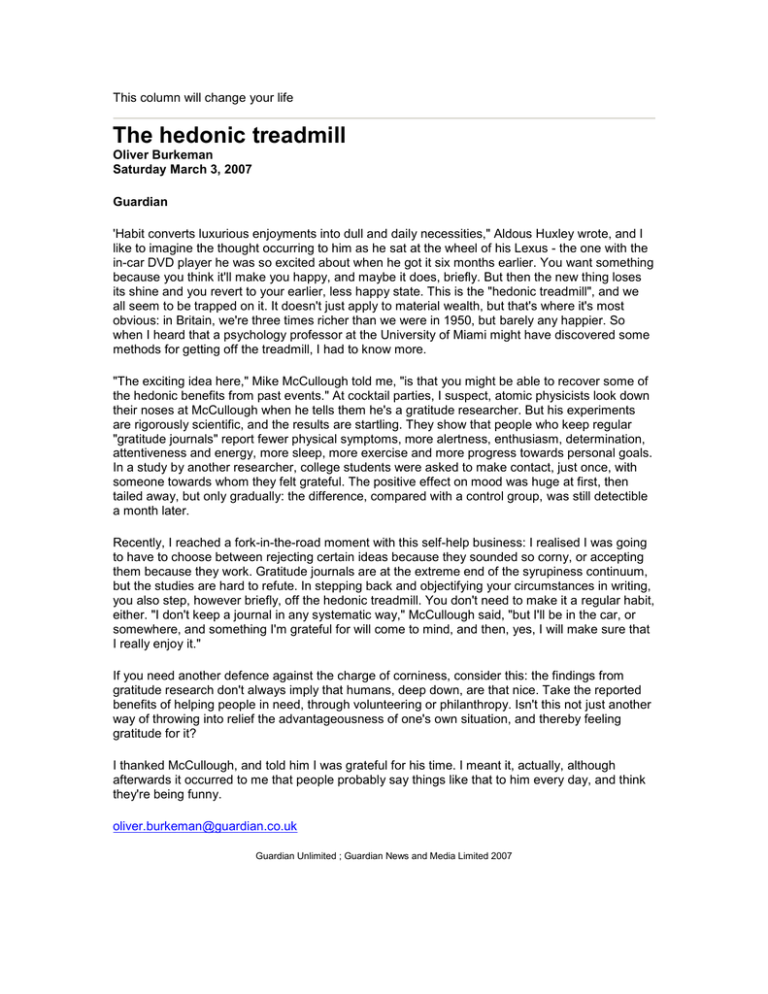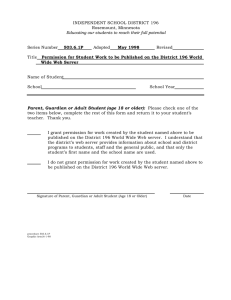The Guardian
advertisement

This column will change your life The hedonic treadmill Oliver Burkeman Saturday March 3, 2007 Guardian 'Habit converts luxurious enjoyments into dull and daily necessities," Aldous Huxley wrote, and I like to imagine the thought occurring to him as he sat at the wheel of his Lexus - the one with the in-car DVD player he was so excited about when he got it six months earlier. You want something because you think it'll make you happy, and maybe it does, briefly. But then the new thing loses its shine and you revert to your earlier, less happy state. This is the "hedonic treadmill", and we all seem to be trapped on it. It doesn't just apply to material wealth, but that's where it's most obvious: in Britain, we're three times richer than we were in 1950, but barely any happier. So when I heard that a psychology professor at the University of Miami might have discovered some methods for getting off the treadmill, I had to know more. "The exciting idea here," Mike McCullough told me, "is that you might be able to recover some of the hedonic benefits from past events." At cocktail parties, I suspect, atomic physicists look down their noses at McCullough when he tells them he's a gratitude researcher. But his experiments are rigorously scientific, and the results are startling. They show that people who keep regular "gratitude journals" report fewer physical symptoms, more alertness, enthusiasm, determination, attentiveness and energy, more sleep, more exercise and more progress towards personal goals. In a study by another researcher, college students were asked to make contact, just once, with someone towards whom they felt grateful. The positive effect on mood was huge at first, then tailed away, but only gradually: the difference, compared with a control group, was still detectible a month later. Recently, I reached a fork-in-the-road moment with this self-help business: I realised I was going to have to choose between rejecting certain ideas because they sounded so corny, or accepting them because they work. Gratitude journals are at the extreme end of the syrupiness continuum, but the studies are hard to refute. In stepping back and objectifying your circumstances in writing, you also step, however briefly, off the hedonic treadmill. You don't need to make it a regular habit, either. "I don't keep a journal in any systematic way," McCullough said, "but I'll be in the car, or somewhere, and something I'm grateful for will come to mind, and then, yes, I will make sure that I really enjoy it." If you need another defence against the charge of corniness, consider this: the findings from gratitude research don't always imply that humans, deep down, are that nice. Take the reported benefits of helping people in need, through volunteering or philanthropy. Isn't this not just another way of throwing into relief the advantageousness of one's own situation, and thereby feeling gratitude for it? I thanked McCullough, and told him I was grateful for his time. I meant it, actually, although afterwards it occurred to me that people probably say things like that to him every day, and think they're being funny. oliver.burkeman@guardian.co.uk Guardian Unlimited ; Guardian News and Media Limited 2007


